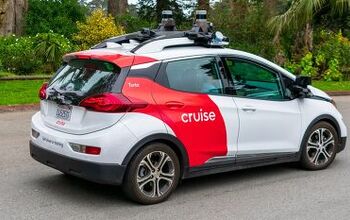The Invisible Hand Of The United States Treasury
Ever since it became clear that the government would rescue General Motors and Chrysler, the Treasury Department has made it clear that it would stay out of “day to day” decision making at the rescued automakers. Allowing the rescued firms to operate independently was a political calculation based on the desire to keep politics from affecting sales at the two rescued automakers, but according to a Reuters special report, Treasury has not been able to keep its hands completely out of important decisions concerning the future of the two firms. Particularly in terms of setting up GM’s Initial Public Offering, Reuters found that the Treasury made important decisions affecting
its speed and size, the fees paid to the bankers and the potential involvement of offshore investors
Though this has kept the IPO out of election season and all of its potential for political problems, there is some downside to the Treasury’s involvement, particularly because it will not be exiting its equity position in GM until about 18 months after the IPO. As a result, analysts predict problems securing investors in a firm that may still be subject to ongoing government control. Morningstar’s David Whiston tells Reuters
I’m sure that there will be some institutional investors, and even some individual investors, that it scares away
Earlier political backlash against the auto bailout is also affecting decisions surrounding the IPO, including whether or not GM’s forthcoming IPO roadshow should make use of private jets, after the automakers received bitter criticism for arriving at the initial bailout hearings in separate private jets. GM plans to continue to use commercial flights as its sells its IPO around the country, but that could change. According to Reuters
Nothing has to be set until the road show begins, but if the bankers have their way, the taxpayer-owned automaker will use private jets for the IPO, sources said.
Said one person involved in the deal: “It is nuts to think people are going to go wait through security lines. And the possibility you would have a missed flight and that that would affect your ability to sell stock? It would be the stupidest decision on the face of the planet.”
“It’s just dumb. It would be so penny-wise, pound-foolish it would be ridiculous,” said the banker.
Government ownership has also complicated GM’s advertising policies, particuarly in regards to preventing backlash against politically-themed advertising. According to the report
GM quietly dropped a plan for a commercial for the Chevy Cruze small car that would have featured Sarah Palin, the polarizing Republican politician, and her comic doppelganger, Tina Fey
Treasury may not have directly intervened in the decision, but its mere ownership of The General clearly affected the decision to keep politics out of advertising. After Ed Whitacre became the company’s CEO, Treasury became more hands-off, allowing the former AT&T exec to run the company as he saw fit. Prior to Whitacre’s ascnt to GM’s top spot, however, CEO Fritz Henderson had far more government interference to deal with. For example, Henderson’s plan to move GM headquarters from the Renaissance Center to nearby Warren, MI, was scuttled by the White House auto task force.
But even Whitacre had to temper his desire for independence with a cooperative approach to GM’s largest stakeholder. Whitacre was infamously eager to push the government out of itst ownership stake during the initial offering, but faced pushback from the government. At that point, it became clear that Treasury would be running the IPO, with investment bank Lazard (former employer of Auto Task Force head Steve Rattner) as its principal adviser. Because Whitacre cared less about which banks underwrote the IPO and more about getting rid of government ownership, one source tells Reuters that the IPO underwriting bids
opened a lobbying circus for Treasury.
Goldman Sachs created a real problem for Treasury when it pushed fee bidding to the ultra-low point of .75 percent. But because of Goldman’s unpopularity in the wake of the Wall Street bailout, Treasury was unwilling to go with the investment bank, even though its fees were lowest. Instead of settling on Goldman, Treasury used its low bids to drive down fee requests by the eventual lead underwriting firms, JPMorgan and MorganStanley. BofA/MerrilLynch and Citi were eventually added as lead underwriters as well after leading GM’s quest for a $5b revolving line of credit, despite protests from JPMorgan and MorganStanley. And the addition of Citi was not inconsequential:
The U.S. Treasury, which owns 61 percent of GM, also owned 12 percent of Citigroup’s common stock. At its core, that set the government up to be potentially both a buyer and a seller of GM stock.
Another area in which the Treasury has played a major role in the lead-up to GM’s IPO: determining which foreign investors could be courted for the IPO. Reuters explains that GM’s Chinese partner SAIC was key in allowing foreign ownership stakes in the new GM:
Bankers involved in the deal argued that funds like the Kuwait and Qatar investment authorities could serve as “cornerstone” investors that could buy and agree to hold a big chunk of the deal in an otherwise tough market.
But the Treasury was sensitive to the potential backlash. Had U.S. taxpayers bailed out GM to subsidize its purchase by foreign governments in the Middle East, Singapore and China? After all, the GM IPO was expected to be priced at a discount of up to 20 percent from what bank analysts determined would be its theoretical value.
By September, the question became more pressing because GM’s partner in Shanghai, Chinese automaker SAIC, had expressed an interest in buying a “single digit” stake, sources said.
That trial balloon put the pressure on Treasury to clarify how investors would be treated. After deliberations involving Bloom and Herb Allison, a former Merrill Lynch executive who was then overseeing the Treasury’s bank bailout fund, Treasury delivered its verdict late on a Friday in mid-September.
In a statement posted online, the Treasury said the GM IPO would be open to the widest range of investors as it looked to “maximize returns” on its stake. The bankers had a green light to pitch the likes of Kuwait and Qatar.
By early October, GM IPO bankers had kicked off meetings with sovereign wealth funds, according to people with knowledge of the proceedings.
GM has since met with Singapore-based GIC and Temasek Holdings, Kuwait Investment Authority, Qatar Investment Authority and the Abu Dhabi Investment Authority, despite early worries over political backlash against foreign ownership of the bailed-out firm.
But GM had already become used to managing the government’s concerns, whether big or small. When Whitacre pounced on subprime lender AmeriCredit, creating a new in-house finance unit, the government was concerned about the move’s effect on former captive finance unit, GMAC.
GM did not consult the Treasury during the discussions and the government was troubled at the last-minute notice before the announcement, people familiar with its thinking said.
U.S. officials were also concerned about how the deal would affect Ally, which is 56 percent owned by the Treasury and remains a major lender to GM, the sources said.
And government backlash even extended to Whitacre’s day-to-day decisions, even if the pressure didn’t always come directly from Treasury.
Whitacre, an enthusiastic outdoorsman, even brought [board member and adviser Steve] Girsky along on a weekday trip to Windsor, Ontario, to get a Canadian fishing license so he could fish both sides of the Detroit River, according to a person with knowledge of the trip.
On the return back through the tunnel that connects Windsor with Detroit, Whitacre and Girsky were stopped by a border patrol agent who seemed puzzled by their story. “Let me get this straight,” he said. “You work for GM and you took off on company time in a company car to get a fishing license?”
The constant pressure of keeping the government happy wore on Whitacre, according to Reuters’ sources, and when the government made it clear that it would not completely exit its ownership stake during the IPO, Whitacre’s frustration boiled over, and he quit suddenly. Not only was the uncertainty bad for GM’s image, but more troubling still, it raised the question of who was really in charge of GM’s future. After all, if Whitacre was the government’s hand-picked choice to run GM and he was leaving over frustrations with the government’s interference, what would future CEOs face?
With Whitacre gone, and the government poised to remain a major shareholder in GM for at least another year, questions over the Government’s role in running General Motors do not seem likely to disappear. Indeed, if GM uses private jets for its IPO roadshow, or if foreign firms take major stakes in the re-launched form, political backlash could push the government into taking a more active role at the automaker. And investors like The Gordian Group’s Peter Kaufman will be stuck asking tough questions without obvious answers.
Are they running this company for profit to shareholders or for other, more political, goals? As long as the government runs this company, that will be a key question.
More by Edward Niedermeyer
Latest Car Reviews
Read moreLatest Product Reviews
Read moreRecent Comments
- Mebgardner I test drove a 2023 2.5 Rav4 last year. I passed on it because it was a very noisy interior, and handled poorly on uneven pavement (filled potholes), which Tucson has many. Very little acoustic padding mean you talk loudly above 55 mph. The forums were also talking about how the roof leaks from not properly sealed roof rack holes, and door windows leaking into the lower door interior. I did not stick around to find out if all that was true. No talk about engine troubles though, this is new info to me.
- Dave Holzman '08 Civic (stick) that I bought used 1/31/12 with 35k on the clock. Now at 159k.It runs as nicely as it did when I bought it. I love the feel of the car. The most expensive replacement was the AC compressor, I think, but something to do with the AC that went at 80k and cost $1300 to replace. It's had more stuff replaced than I expected, but not enough to make me want to ditch a car that I truly enjoy driving.
- ToolGuy Let's review: I am a poor unsuccessful loser. Any car company which introduced an EV which I could afford would earn my contempt. Of course I would buy it, but I wouldn't respect them. 😉
- ToolGuy Correct answer is the one that isn't a Honda.
- 1995 SC Man it isn't even the weekend yet


































Comments
Join the conversation
There is a two word term for everything in this article, the first word is cluster, guess the second. Even after all that has happened GM still hasn't a clue. The genius that came up with Sarah Palin and TIna Fey in an ad ought to be fired immediately if not taken out and shot. Whing about having to fly commercial, buying a sub-prime lender, pretty much everything they have done just says that they are incapable of running their business. Even if the IPO goes smoothly they're going to screw it up again. It's inevitable, they can't help themselves.
The US govt is a colossus that prints money, sets mfg regulations, oversees banking and enforces labor law among its many other powers. How anyone could think that such a powerful entity can act as a regular 'investor' in capital markets is not keeping their eye on the big picture.